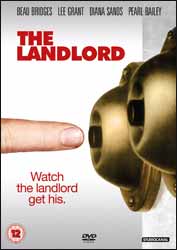|
Click here to return to the main site. DVD Review
Elgar Enders, at the age of twenty-nine decides it time to move out of home and set up on his own. With his wealth he buys a rundown tenement in a black area, intending to evict the current residents and build himself a little town palace. As he gets to know his neighbours, he not only starts to change his mind, but also fall in love with a local girl... The Landlord (1970 - 1hr, 45 min, 58 sec) is a comedy drama directed by Hal Ashby (Harold and Maude, Shampoo, The Last Detail and Being There) from a novel by Kristin Hunter. The film proposes its two central themes in the first two minutes, with a teacher asking her class: "Well children, how do we live?", before cutting to the privileged Elgar Enders being served a drink by his black man servant. Most film's which look at the relationship between blacks and whites usually concentrate on the white man riding to the rescue to elevate the condition of the black. Not only is this condescending, but also, in one swipe, ignores and denigrates that which makes black culture special and distinctive. Landlord takes a much more realistic, complex and downbeat look at the relationship. Being Ashby’s first stint as a director, taking into account his work as a film editor on films as diverse as The Cincinnati Kid (1965), In the Heat of the Night (1967) and The Thomas Crown Affair (1968) it’s little wonder that the film, which was made at a time of an emergent new wave of directors and experimentation, that some of the editing in the film is on the, stylistically, heavy side. It doesn’t spoil the film but it does mark it out as a child of its time. Elgar (Beau Bridges) is not a bad kid and certainly does not appear to have a conscious racist bone in his body, but he does display the general disregard for other human beings endemic in his privileged background. Rather than run to the tenants ultimate rescue they rescue Elgar from a life of unconscious generalised prejudice, opening his eyes to the richness of human experience. None more so than Francine MarieJohnson (Diana Sands) with whom he has a relationship, even though her boyfriend, Copee Johnson (Louis Gossett Jr.) is more than a tad unhinged. There are some wonderful performances by the other actors, especially Mel Stewart (Professor Duboise) who struggles to teach the local children and persuade Elgar of the superiority of black culture, thereby exposing his own racism and Pearl Bailey (Marge) as the sassy older resident and font of pertinent knowledge who first introduces herself to the new landlord by shoving a double barrelled shot gun in his face. The story may well have an important question, can black and white really coexist, it’s not one that the film answers. The ending of the movie leaves that point up to the audience. It’s an old question, probably as old as man, who feels the need to divide himself down factional lines, so whether it is Romeo and Juliet or Elgar and Francine, the question remains. For such a heavy subject, the film is diffused with humour, partially at the characters expense, but often at the absurdities of these false divisions. The film print is grainy, as one would expect of a movie of this age and was part of the original and not a fault of the processing of the DVD. It is shown with an aspect ratio of 1.85:1 with a mono 2.0 audio track. There are no extras on the disc. As a film dealing with racism, it is not as serious as Guess Who's Coming to Dinner (1967) or In the Heat of the Night (1967), but it has a point to make and it makes it well. 7 Charles Packer |
|---|

